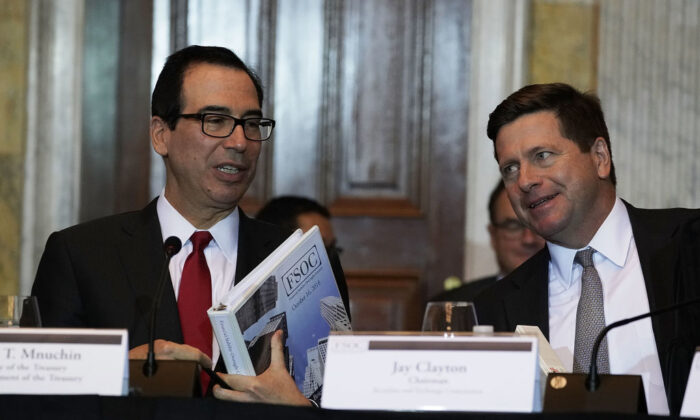Swedish Singer Says Collaboration With Huawei ‘Not the Smartest Deal’ Amid Criticism
Chinese companies listed on U.S. stock exchanges could soon be delisted for failure to comply with American audit standards, after advisors to President Donald Trump issued a report on how to protect U.S. investors.
The report was put together by the President’s Working Group on Financial Markets (PWG), which includes Steven Mnuchin, the Treasury Secretary, and Jay Clayton, chairman of the Securities and Exchange Commission (SEC).
Trump asked for such a report in early June, seeking recommendations on how to deal with listed Chinese companies that take advantage of U.S. capital markets but operate under lax standards.
The report (pdf) recommends a deadline of Jan. 1, 2022 for listed Chinese companies to make their audit documents available to U.S. auditing watchdog Public Company Accounting Oversight Board (PCAOB). If not, they should be delisted from the U.S. stock exchanges.
Chinese companies that want to list on U.S. stock exchanges must comply with the new requirements after SEC officials draw up rules to put the recommendation into law.
“The recommendations outlined in the report will increase investor protection and level the playing field for all companies listed on U.S. exchanges,” said Mnuchin, who is also the chairman of the PWG, according to an Aug. 6 press release from the Treasury Department.
To avoid delisting, listed Chinese companies could hire a co-auditor that PCAOB determines has sufficient access to the audit documents.
The PCAOB routinely examine audits conducted by U.S.-based accounting firms to ensure public companies’ financial statements are accurate, thus protecting investors and ensuring corporations comply with securities law.
However, for more than a decade, PCAOB has not been allowed to examine audits and records of China-based companies listed on U.S. exchanges because Beijing claims their books constitute “state secrets” and cannot be shared with outside parties.
China recently added new restrictions against foreign auditing regulators. In May, China Securities Regulatory Commission (CSRC) amended the local securities law, adding new provisions requiring companies and individuals in China to obtain approval from the security regulatory authority under China’s State Council before they can provide documents relating to securities activities to overseas regulators.
From 2011 to 2012, more than 100 Chinese companies were suspended or delisted, many for reasons such as insolvency and failing to file timely financial reports. In late June, Luckin Coffee, which was once a huge rival to Starbucks in China, was delisted just 13 months after its initial public offering on the Nasdaq in May 2019. The Chinese coffee start-up was found to have fabricated over $300 million in sales.
The report also recommends requiring enhanced disclosures by issuers and registered funds about the risks of investing in China, encouraging more due diligence by funds that track indexes, and issuing guidance to investment advisors about fiduciary obligations involving investments in China.
The Senate has recently taken action to address the problem faced by PCAOB after it unanimously passed a bill (S.945) that would prohibit securities from Chinese companies from being traded on U.S. stock exchanges if these companies fail to submit to PCAOB oversight. Sens. John Kennedy (R-La.) and Chris Van Hollen (D-Md.) introduced the bill in March.
In June last year, Kennedy and Van Hollen wrote (pdf) to United States Trade Representative Robert Lighthizer, urging him to include conditions in any trade deal with China that would subject listed Chinese companies to U.S. auditing requirements.
“We’re thankful the president’s working group is committed to holding fraudulent Chinese companies accountable,” said Kennedy and Van Hollen in a joint statement in response to the PWG’s recommendations.
They added: “Now, it’s time for the House to enshrine this policy in law. Short of that, we cannot ensure that firms beholden to Communist China will let U.S. regulators examine their books, which means we can’t protect American retirement and college savings from being exploited.”
The report also pointed to how PCAOB tried to negotiate with Chinese authorities since 2007. It pointed out how between 2015 and 2017, CRSC rejected PCAOB’s request to inspect the audits of China’s state-owned enterprises (SOEs), such as Chinese tech giant Baidu and e-commerce giant Alibaba.
The PCAOB said its memorandum of understanding (MOU) signed with CRSC and China’s Ministry of Finance in 2013 was “not effective in promoting enforcement cooperation.” Since signing the MOU, PCAOB said China either did not provide any documents at all upon request, or was “so untimely and incomplete as to stifle meaningful progress on the investigation.”
“We have not received any documents since 2015,” the PCAOB stated.
Focus News: White House Moves to Enforce Auditing Rules on US-listed Chinese Companies
Foreign Staff at EU Firms in Shanghai Still Unable to Return, Business Group Says
